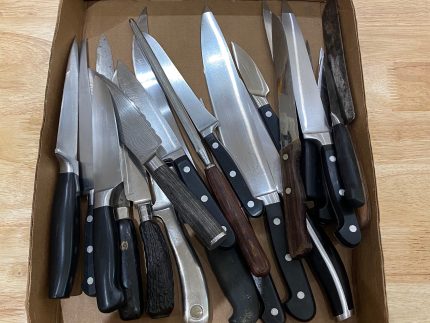Shop New Vintage Au Nain 9.5″ Semi-Flex Slicer Carbon Rosette Beechwood St. Remy, Thiers, France 1950-70 online and show your support for your favorite team. This New Vintage Au Nain 9.5″ Semi-Flex Slicer Carbon Rosette Beechwood St. Remy, Thiers, France 1950-70 item is made of 100% polyester and has a breathable mesh back.
This is a 100% authentic New Vintage Au Nain 9.5″ Semi-Flex Slicer Carbon Rosette Beechwood St. Remy, Thiers, France 1950-70 . The team’s authentic New Vintage Au Nain 9.5″ Semi-Flex Slicer Carbon Rosette Beechwood St. Remy, Thiers, France 1950-70 has the official name and number on the back. With the New Vintage Au Nain 9.5″ Semi-Flex Slicer Carbon Rosette Beechwood St. Remy, Thiers, France 1950-70 name and logo on the front, this product is the perfect gift for the New Vintage Au Nain 9.5″ Semi-Flex Slicer Carbon Rosette Beechwood St. Remy, Thiers, France 1950-70 fan in your life.
Unused vintage Au Nain 9.5″ semi flexible hand forged carbon steel (tapered tang and blade) knife with rosette riveted beechwood handle. Blade is either unmarked or marked Au Nain Extra, handle is in the old style pre-miter cut (1950’s- early 60’s?) Made in Thiers France.
This was likely made for French butchers who do use a semi flexible knife to cut out silver skin but this would be great for any number of jobs where a thin but springy narrow blade is key.
Please note these can have small rust spots or imperfections, slight cants or waviness to the edge is possible as well. We have removed as much active rust without changing the finish or blade thickness, we do quality control on these but imperfections are part of the picture.
Please request sharpening if desired, they are not sharp now.
Au Nain is a 4th generation family cutlery business that was founded in 1885 by Gaston Saint-Joanis in Saint-Rémy-sur-Durolle, near Thiers. The name ‘Au Nain’ (meaning The Dwarf) was chosen as a playful response to their main competitor at that time – ‘Géant du Couteau’ (The Knife Giant). Much of Au Nain’s manufacturing process is still in-house (from handling to polishing and sharpening, etc.) which is becoming less and less common. They continue to uphold traditional knife making processes characteristic to Thiers.

















